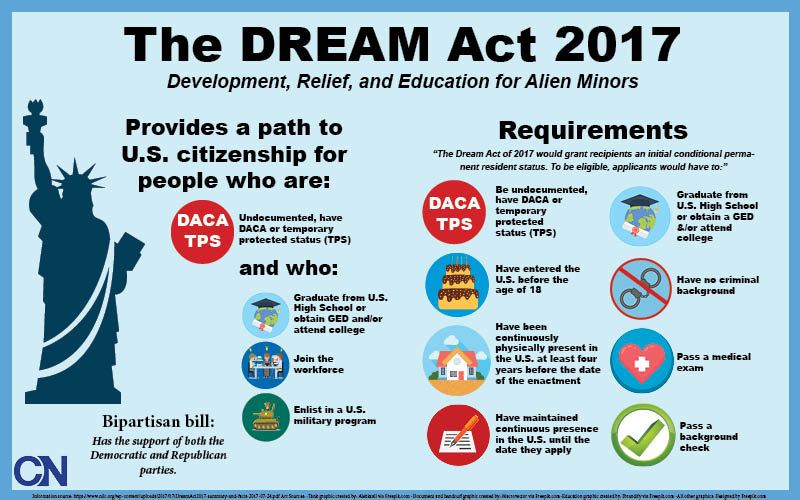PHOENIX — Two weeks after DACA was rescinded by President Donald Trump, many supporters and dissenters have now shifted their focus to the DREAM Act.
The DREAM (Development, Relief, and Education for Alien Minors) Act was originally introduced in August 2001 by Sens. Dick Durbin (R-Illinois) and Orrin Hatch (R-Utah). In its current form, the bill would provide a pathway for undocumented immigrants who arrived in the country as children to become permanent residents of the United States.
The DREAM Act is currently sponsored by Sen. Lindsay Graham (R-South Carolina) and co-sponsored by a group of bipartisan legislators, including Arizona Republican Sen. Jeff Flake.
To qualify for conditional permanent resident status under the DREAM Act, applicants would have to:
1. Be undocumented, a DACA (Deferred Action for Childhood Arrivals) recipient or a TPS (temporary protected status) beneficiary
2. Have entered the U.S. before the age of 18
3. Have been continuously physically present in the U.S. at least four years before the date of the DREAM Act’s enactment
4. Have maintained continuous presence in the U.S. until the date they apply
5. Meet the education requirement (high school diploma or G.E.D. equivalent and/or college degree)
6. Have no criminal background
7. Pass a medical exam
8. Pass a background check
And with attention shifting to the DREAM Act, several public officials have let their opinions be known about the legislation.
Although Flake voted against it in the House of Representatives in 2010, he now supports it.
In a statement, he called DACA “a poor substitute for permanent, bipartisan legislation to fix our broken immigration system” and said the “ball is back in Congress’ court where it belongs”.
Adam Ziff, who works with Flake’s Tucson office, said the DREAM Act is the most popular topic that constituents call about. Ziff said the majority of callers “absolutely” support the DREAM Act.
Arizona Republican Sen. John McCain also voted against the DREAM Act in 2010 but has since changed his opinion.
In a statement after Trump rescinded DACA, McCain said “I will be working with my colleagues on both sides of the aisle to devise and pass comprehensive immigration reform, which will include the DREAM Act”.
David Huff, a political science sophomore at Arizona State University, isn’t surprised by McCain’s support of the DREAM Act. Huff said McCain is a “maverick” who always “stands up for what is right.”
However, not all Arizona constituents agree with McCain and Flake’s views on the DREAM Act.
Mike Monfred, a 44-year-old Arizona native, thinks DREAMers should have to enter the country with proper documentation.
“You’re not supposed to do it illegally,” Monfred said. “To me, it doesn’t matter if they were brought here at 3, 13 or 30 – the whole point is they’re here illegally. Their mom and dad knew it was illegal. They know it’s illegal.”
Monfred emphasized that federal law prohibits people from entering the country without undocumentation.
“If all of these DREAMers say they’re so in love with this country, why don’t they follow the federal law then?” he said. “My whole point is I play by the rules.”
According to The New York Times, the most common age for DACA recipients to have first entered the U.S. is age 3.
Monfred said age doesn’t matter to him.
“When a 3-year-old commits a problem, their parents take care of it,” Monfred said. “Nothing has been done to the parents that have created this problem. They’ve been allowed to stay. They’ve been given citizenship, free house, free food and I’ve seen it.”
However, those who fall under DACA protections are not given citizenship, free houses or free food.
Meanwhile, ASU President Michael Crow has expressed his own support for the DREAM Act, saying in a statement he would “work with the Arizona Congressional Delegation and other members of Congress to enact the DREAM Act or other appropriate federal legislation.”
Oscar Hernandez Ortiz, an ASU student and DACA recipient, appreciated Crow including the DREAM Act in his statement.
“I like that it’s detailed, specifically how we’re going to be working with Congress people to pass the DREAM Act,” Ortiz said.
On the national stage, House Speaker Paul Ryan (R-Wisconsin) said in an interview Wednesday with the Associated Press that “there has got to be a solution to this problem.”
“Kicking these 800,000 kids out to these countries that they probably not been to since they were toddlers … is not in our nation’s interest,” Ryan said.
Denis Alvarez agrees. She has lived in Phoenix since she was 4 years old.
“I don’t know any other life other than this one,” Alvarez said.
Ryan was set to meet with House Majority Leader Kevin McCarthy (R-California) and House Minority Leader Nancy Pelosi (D-California) to discuss the future of the DREAM Act.
Belén Sisa, a DACA recipient, said she has hope but it isn’t because of political conversations like the one scheduled between Ryan and Pelosi.
“I’m hopeful in my community and the people who are affected and all of our allies to come together and to pressure them to make these decisions,” Sisa said at a United Students for Education Equity meeting Sept. 7.
Sisa has lived in Phoenix since she was 6 years old. She went to elementary, middle and high school in Phoenix and is now in college at ASU. Sisa said people don’t understand the “destruction” that would occur if a legislative solution cannot be reached.
“This country benefited from us, economically,” she said. “Not even just that, we’re human beings. We have lives. We can’t just be living up and down constantly not knowing what’s going to happen next and we can’t continue being vulnerable to being taken away from the only place we know.”
“The only place we call home,” Sisa said.
